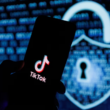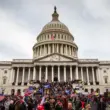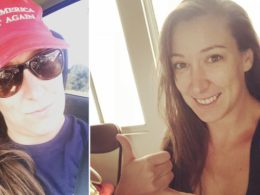America’s educators went from teaching that race doesn’t matter, but the character does, to teaching our kids to define each other by their race. The rot in Oklahoma goes from the elementary school classroom to the college lecture hall.
According to FIRE, the Foundation for Individual Rights in Education, Oklahoma University (OU) is and has been providing workshops that promote the use of censorship by professors and critical race theory training.
In April, the University provided a one-hour workshop called the “Anti-Rhetoric and Pedagogies,” which FIRE says is one of nine professional development workshops. The authors of the workshop – Kasey Woody, Annie Bridgers-Smith, and Kelli Alvares – claim to be teaching how to identify harmful racist “rhetoric and pedagogies.”
In the first 2 minutes of the lecture, Kelli Alvarez shows slide questions that are more of the anti-white racist teachings. The questions provided to keep the participants following along include: “How can we disrupt the settler-colonial (white supremacist) narrative?”
One of the first presenters is Annie Bridgers-Smith – who remarked we could call her Annie and not her “government name” Antoinette. After announcing that OU’s Class of 2024 will be “one of its most diverse freshman classes in its 130-year history,” Annie says the college needs to “mostly refrain from simply acknowledging it as ‘hey you exist that’s great’ as she calls that “performative acknowledgment.”
Annie teaches that instructors at OU have a responsibility to help minorities feel included in the classroom, which means censoring speech that could hurt their feelings. She says to the participants, made up of instructors and grad students at OU, “We all obviously are going to be identifying and calling out instances of overt racism and whether it’s a conversation or a student’s paper or a dialogue in the classroom.” But she says that’s not enough. “We have to be making sure we are looking out for those nuanced aspects as well that could lead to our students feeling like that do not belong.”
“Shut the door to racist dialogue,” Annie says. But, unfortunately, the students at OU don’t have a choice to think for themselves because the University professors who hate their “government names” believe that “our adherence to ‘standard’ English” promotes “white-upper-class, ways of speaking and writing.”
Annie says the “One thing that we can really do to disrupt the dominant narrative is to constantly emphasize the fact that we are on land that is not ours.” She calls this “land acknowledgments” and encourages her students to text a number with their zip code to receive the response telling them which indigenous tribe’s land their home is now occupying.
A separate presenter, Kelli Alvarez, an English professor, said she has her students read When Free Speech Becomes Unfree Speech by Ibram Kendi at the beginning of every semester. Kelli claims to not allow anyone in her class to use “derogatory remarks, critiques, and hate speech.”
Kelli doesn’t define hate speech, but you can guess her definition as she says that students in her undergrad courses are “a little bit more emboldened to be racist.”
Kelli proudly remarks, “And I tell them to avoid white supremacist ideas or sources when they’re making their own arguments. If they are working to try to persuade a white supremacist … against racism, then they have to look at those sources.” Otherwise, she says any use of those “white supremacist” sources should be reported for “violating the Student Code of Conduct.”
“One of the fears is that we’re going to get in trouble for this, right? Like we can’t tell students that they can’t say something in class. But we can! And let me tell you how,” Kelli exclaims her delights to have a workaround the right of free speech in a college classroom.
The other presenter, Kasey Woody, says it’s not enough to get her students to stop talking and writing like a “white supremacist.” Instead, she often redirects students attempting to think ideas that wander into “problematic territory.”
Kasey explains, “I, in this case, usually look for my students who might be, like, entertaining the idea of listening to a problematic argument. Then I say, ‘we don’t have to listen to that.’ ” And don’t fret about blowback from OU. She said, “You do not need to worry about repercussions at any degree in the university if you are responding to a student who is using problematic language in the classroom.”
“And so, as instructors, we can tell our students: ‘no, you do not have the right to say that. Stop talking right now,’ right?’ ”
Follow Marmee Rooke and Tatum Report on Twitter
- Ukraine Slams Biden Admin’s Hysterics; Says Americans Are Safer In Kyiv Than LA - January 24, 2022
- Virginia Attorney General Files Motion To Dismiss Case Against Youngkin’s Anti-Mandate EO - January 21, 2022
- Are M&M’s Woke? Exec Says The Company Is Making The Candy Characters More ‘Inclusive’ - January 21, 2022










